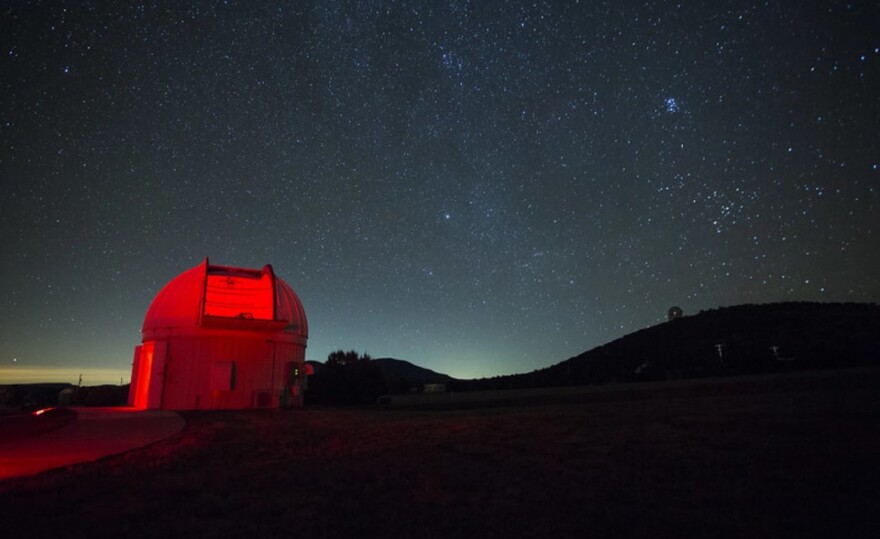The Hill Country is known for its skies – dark skies, that is. Tourists come from all over for a clear look at the stars.
Texas state Rep. Erin Zwiener wants to make sure that astrotourism to the region continues. Ahead of the legislative session, she filed a bill that would allow cities to enforce lighting ordinances outside official city limits.
Zwiener said the ability to enforce is especially important for a place like Dripping Springs, where the town's unincorporated area is especially spread out, reaching all the way to Buda city limits. An unincorporated area is essentially a buffer zone outside official city limits.
The government in Dripping Springs has interpreted its lighting ordinance to mean it can regulate lighting only within city limits, Zwiener said, so not in that buffer zone.
“They run into some challenges with that [because] light, of course, does not respect city boundaries very neatly," she said.
Hays County is home to several International Dark Sky communities, an official designation granted by the International Dark-Sky Association. The nonprofit defines these communities as having shown “exceptional dedication to the preservation of the night sky” through things like lobbying for outdoor lighting ordinances and community outreach and education.
“We think some of our communities would like the clarity to know that they can enforce dark skies rules in their extraterritorial jurisdictions,” Zwiener said.
Shannon du Plessis helped Wimberley Valley secure its IDA designation in 2018. She also co-founded and chaired the Wimberley Valley Dark Sky Committee. She said she has gotten calls from people who live outside city limits wondering what they can do about their neighbors' bright lights.
“We're all thrilled because if it passes, that means that we'll be able to help more members of the community,” du Plessis said.
The bill would make the violation of a lighting ordinance in those unincorporated areas a criminal offense that a municipality could pursue in court.
“If [someone] lives in the [extraterritorial jurisdiction], we can refer them to either the City of Wimberley or the City of Wood Creek, whichever would make sense for them," du Plessis said. "It will extend the powers of these city ordinances to a much, much larger area, which will then make the skies even darker."
Zwiener said it’s a big issue for the region, but not just for aesthetic reasons.
Because stargazing occurs in the evening, she said, tourists are more likely to stay overnight instead of just making a day trip.
“Their ability to protect the night sky isn't just about it being beautiful; it's also about putting dollars in the pockets of their tourism businesses," Zwiener said.
And because Hays County is growing so quickly, with much of the development happening outside city limits, Zwiener said it's important to give cities a little more power to make sure those developments are done well.
"And in a way that protects the entire community,” she said.
Du Plessis agrees the ability to enforce and regulate lighting helps contribute to identity – and business – in Wimberley.
“We have signs on the three roads that come into Wimberley that say we're an International Dark Sky Community,” she said. “It helps the realtors when they're selling houses and the [bed and breakfasts] saying, ‘Hey, we keep our skies dark here.’”
But the bill has some gaps in enforcement.
There are holes in the map that show Dripping Springs' unincorporated areas. The holes were created in the 1980s, when the City of Austin wanted to expand its boundaries close to Dripping Springs. The two cities settled on letting landowners petition to be included in the Dripping Springs' extraterritorial jurisdiction (ETJ).
It’s this circumstance that has Cindy Luongo-Cassidy, who obtained the Dark Skies designation for Dripping Springs back in 2014, petitioning for a broader law.
“Let's get the cities to be able to enforce this in their ETJ. I totally support that,” Luongo-Cassidy said. “But I'm also saying: You know what? We've got to keep in mind and remind people that the state could do this statewide.”
A statewide approach would mean that lighting could be enforced even in the “doughnut holes.”
But for now, many agree House Bill 298 is a good place to start.
“The Hill Country is a beautiful place. That's why I live here and so many other folks do as well,” Zwiener said. “It's why folks from all around the state and the country in the world come to visit. ... Folks enjoy tracing the constellations, actually seeing the Milky Way, and that's something we can enjoy here ... and it's something we need to protect.”
Got a tip? Email Riane Roldan at rroldan@kut.org. Follow her on Twitter @RianeRoldan.

